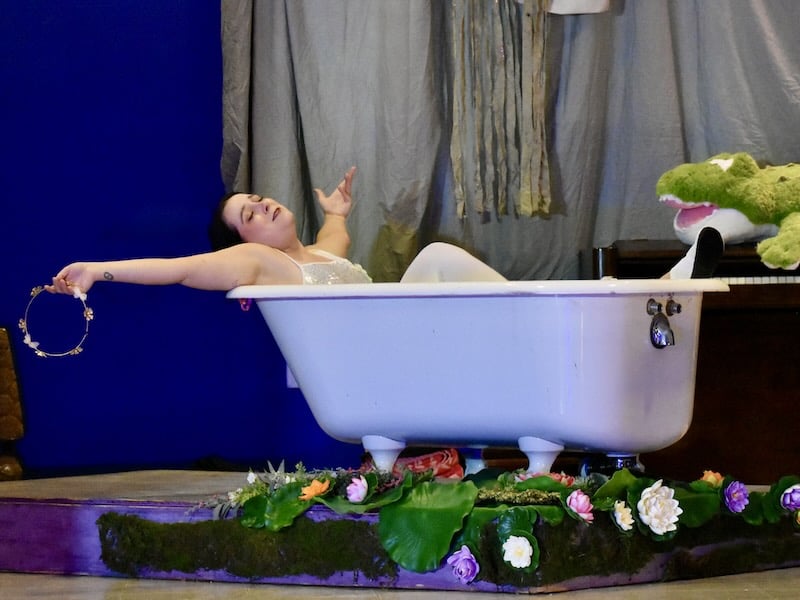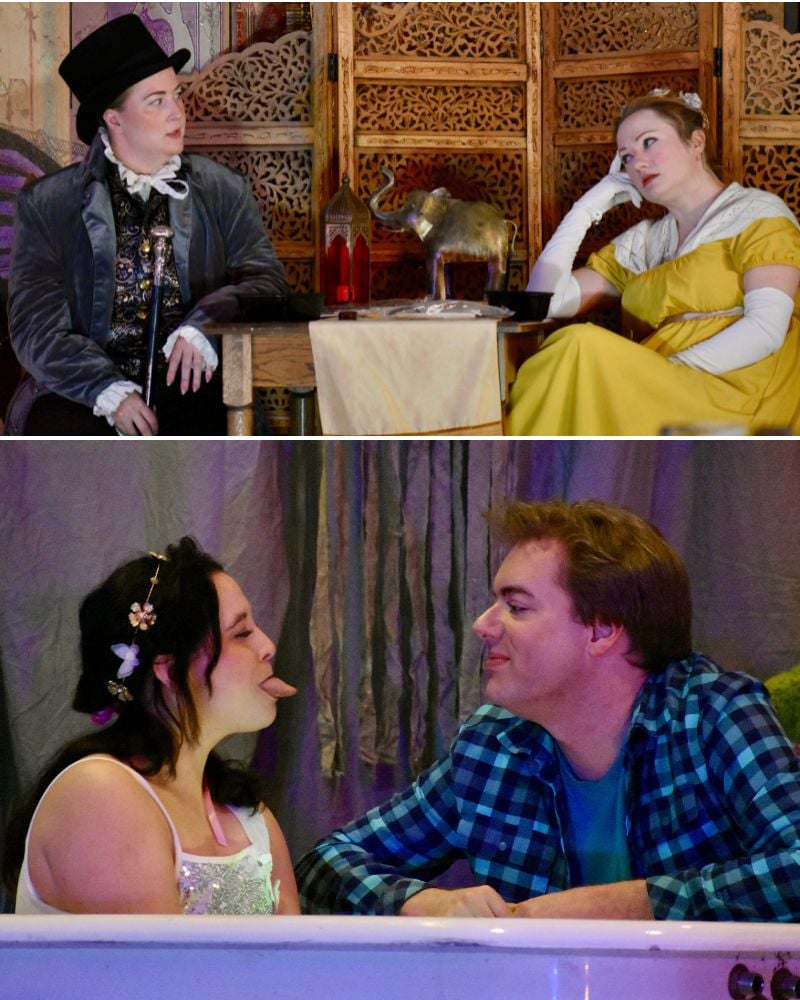Rachel Luann Strayer’s Drowning Ophelia opens with a young woman going about typical young-woman stuff — being worried about having enough time to make dinner after work, yada yada — meanwhile, there’s a sweet, virginal maiden frolicking in a bathtub behind her and vocalizing operatically about Valentine’s Day.
The contemporary young woman seems to absolutely hate the maiden, yelling at her to “shut up” regularly — and the maiden absolutely won’t stop.

The young woman, Jane (Jessa Whitley-Hill), who goes by “Janie,” has signed up for improvisational acting lessons with a female-presenting acting teacher (Karina Hilleard), who we learn over time has been asked by Janie to play classically appealing male romantic leads in medieval times, Regency era, and the American 1950s. Meanwhile, Janie’s older brother (Justin Meyer) leaves her voicemails, pleading to talk with her. He also engages with the maiden (Sarah Daniels), who appears to play a younger sister of the male figure.
But on top of typical sibling rivalry comes jarring, over-the-line meanness from the brother. Why — and why is that rivalry, as well as Janie’s mania, intensifying? The first little-more-than-half of the play offers up delicious, Lynchian surrealism. The audience delights in wondering, where in Strayer’s dialogue, set design, and performance can we pick out new connections and answers?
As Janie, with absolute terror in her eyes, continues to not return her older brother’s pleading voicemails, begins to not just whine but shriek “SHUT UP!” at the maiden, and becomes even more erratic with her acting instructor — and as the maiden continues to fill up the bathtub one bucket at a time from a seeming subconsciousness — we begin to read into Janie’s physical life her mind’s interior.
When the plot lynchpin finally arrives through a harrowing scene with Ophelia and the older brother, we are given a reveal: Jane’s older brother assaulted her, including in a sexual manner, when she was a child. The youthful figure in the bathtub who the play’s title leads us to call “Ophelia” has been an embodiment of Jane’s playful, beautiful childhood innocence.
The kind of male figure Jane had around her as a child helps explain why the male romantic leads Janie requested are so foppish and sensitive.

Under Dr. Lori Lind’s direction, Drowning Ophelia is a gripping, tear-inducing drama about how abuse changes how we view ourselves: how we finish the work of our abusers when we throw out the Ophelia with the bath. We associate good, beautiful parts of our lives with hurt, and then cast those “selves” out, to our own detriment. We drown our Ophelias at our peril.
Sarah Daniels is a stunning Ophelia with a staggeringly beautiful operatic vocal talent that we get to enjoy throughout the show. Also, this specific Shakespeare Opera Theatre production has added music to the words provided in the script from the 1868 opera version of Hamlet by Ambroise Thomas. The tune is perfectly selected for Ophelia’s character: bright and pretty in the first phrase and foreboding in the second.
Daniels perfectly acts the amalgam’s innocence and grace, changing her idiosyncrasies only just enough and remaining in the spirit of her symbol when she plays the “younger sister.” Justin Meyer perfectly embodies the “older brother who went too far,” obviously going far more than that at one point — he plays the character so reasonably when he’s not being utterly cruel. His performance helps us see exactly how the situation went frog-in-the-water: a crucial piece of the narrative puzzle.
Jessa Whitley-Hill has a challenging role to take on. It is difficult to root for Janie for the majority of the show when her personality boils down to “stressed,” “busy,” “short with her acting teacher,” “aspiring performing artist or LARPer but surprisingly insulated,” and “ignores her brother’s phone calls.” When we finally understand why she’s troubled, we of course develop compassion, but that’s only after we’ve spent most of the show wondering why she’s so unpleasant. Particularly to this innocent Disney Princess whose crimes are singing too much and simply reminding Janie of what happened to her.
Whitley-Hill’s Janie is so pointy and precarious that we find ourselves worried about her and scared of her. If we were able to develop more of an affinity and compassion for her long before the reveal, it would strengthen our foundation of compassion in preparation for the reveal. And given that the entire show revolves around Janie and her experience, a stronger connection with Janie in general would create a stronger connection between the audience and the show at large.
The production’s design is beautiful, with a variety of textures creating a fairytale-forest look adorning the walls. The seating arrangement is cabaret-style, and the bowls of water on each table containing decorative flower-lights add to the immersion. The Shakespeare Opera Theatre has also offered particularly extensive food and drink options for the night, specializing in comfort food that actually becomes part of the staging for a welcoming atmosphere.
There could be more of a contrast between the visual design of the part of the stage portioned for Janie’s apartment and life and the world of Ophelia: even just a subtle one to avoid giving away the plot early but to creatively distinguish the two worlds. Currently, there is an unintentional contrast: Ophelia’s section has gritty, texture-heavy fabrics and sumptuous flowers lining the walls, and Janie’s apartment has some of this but with pre-printed floral bohemian patterns galore. If the goal was to suggest that Janie relies on others’ pre-printed artistry to create beauty in her busy life, that makes sense narratively, but detracts from the overall appearance of the set, particularly given that so much natural texture and actual flowers play such a prominent, beautiful role in the set but are clashed with so noticeably by others’ ready-made artwork.
The Shakespeare Opera Theatre website mentions that the show includes themes about “mental health, trauma, and childhood abuse,” but an additional warning about “sexual abuse” or “sexual content” specifically may be helpful.
This production of this urgent new play is beautifully performed, offering a feast of storytelling for the playgoer and an emotionally harrowing story that encourages us to reflect on what beautiful, truly good parts of ourselves we may be stamping out in light of others’ cruelty. It tells this sensitive story with artistry, subtlety, and grace.
Running Time: Approximately 75 minutes.
Drowning Ophelia played April 4 to 12, 2025, presented by Shakespeare Opera Theatre performing at St. Thomas Episcopal Church, 8991 Brook Rd., McLean VA. For tickets (Adults, $45–$59.50; Youth 18–25, $35; Children under 18, $25), buy them at the door, or purchase them online. Friday, April 11, is Pay What You Will.
The cast and creative credits are online here.
COVID Safety: Masks optional.



